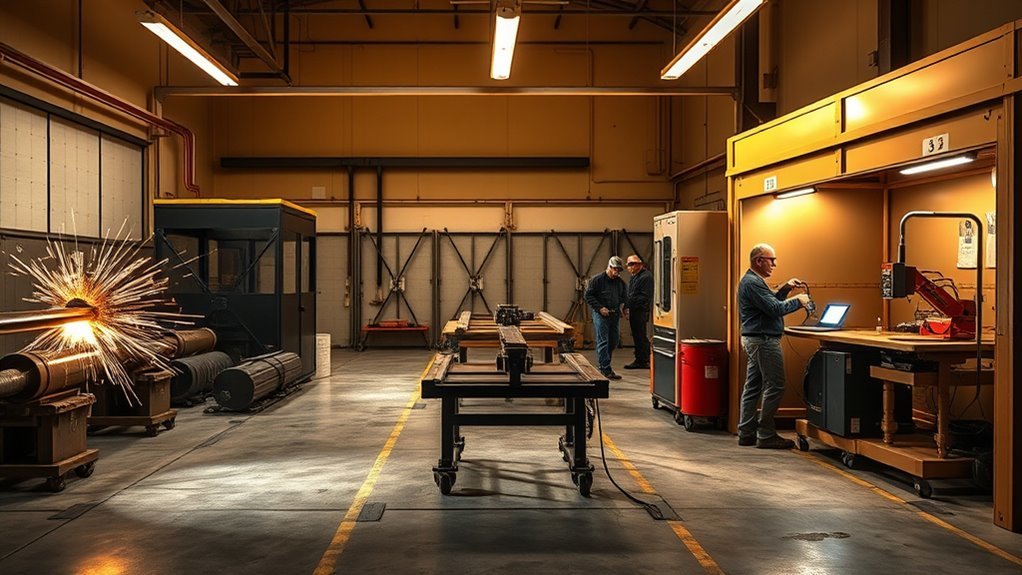Updated on 2025-11-21
Planning for welding school in Missouri? Here’s what tuition really looks like once you include gear, metals, and living costs—plus how program length and specialization change the total.
In Missouri, welding programs typically cost $5,000–$30,000. Short hobby classes can be under $300, while full pipe or structural tracks commonly land around $14,000–$26,000 once supplies and lab materials are included. Budget extra for PPE, metals, and housing or commuting to estimate your true total.
Key takeaways
- Most full programs total $14k–$26k with gear and supplies included.
- Compare hours: structural (~440 hrs), pipe (~720 hrs), fitting (~400 hrs).
- Housing can add ~$750–$850/month; scholarships and loans can reduce net cost.
Typical Tuition Ranges for Missouri Welding Programs

You’ll typically pay between $5,000 and $30,000 for welding school in Missouri, depending on program length, specialization, and whether tuition includes gear and materials. Short hobby courses can run under $300, while full pipe or structural programs often total $14,000–$26,000 once supplies and lab fees are added. Budget for PPE, metals, and possible housing or commute costs. Check scholarships, school loans, and placement services to lower net cost if you want more details.
Expect Missouri welding tuition to typically range from about $5,000 up to $30,000, depending on program length and materials.
You should compare programs by length, scope, and what’s bundled: the Missouri Welding Institute lists about $25,900 for courses including gear and books, while its Pipe Welding Program is $18,900 and the Master Structural Welding & Fitting program is $14,900. See MWI program details.
Criders Institute offers 16–24 week programs, from a $285 hobbyist course to a $21,000 Master Pipe Welding Program. See Crider’s tuition.
When you do program comparisons, note whether tuition covers supplies or if you’ll need extra purchases. Look into welding scholarships and grants early; they can reduce your out-of-pocket cost greatly and affect which program is most affordable for you.
Breakdown of Program Costs: Tuition, Gear, and Supplies

When you compare program costs, separate the headline tuition from the predictable fees for gear and the variable costs for metals and consumable supplies.
For example, MWI’s Pipe Welding Program lists $15,520 tuition plus $720 for gear and about $2,480 for metal and supplies, while other programs may bundle gear and books into the total.
Track each line item—tuition, mandatory fees, personal protective equipment, and per-project metals—so you can budget and evaluate financial aid options accurately.
Tuition and Fees
Several clear cost components make up welding program pricing at Missouri Welding Institute, so you can budget accurately before enrolling.
Focus first on tuition: full program tuition tops out at $25,900 (all-inclusive), while specific programs list tuition separately—Pipe Welding tuition is $15,520 and Master Structural Welding & Fitting tuition is $11,100.
Know the fee structure: some courses add lab fees embedded in “gear, supplies, and books” totals; for example, Pipe Welding’s non-tuition items total $3,380.
Master/Advanced Pipe Fitting is a 400-hour program priced at $14,900. Custom Courses are billed at $49/hour with a one-week minimum—request a written quote for custom scopes.
Gear, Metals, Supplies
Gear and supplies are a predictable part of your total cost and MWI itemizes them so you can see where money goes. You’ll budget for welding equipment and safety gear alongside tuition. For the Pipe Welding Program, gear is $720 and metals/supplies $2,480; for Master Structural Welding & Fitting, gear is $450 and metals/supplies $3,170.
| Program | Gear | Metals & Supplies |
|---|---|---|
| Pipe Welding | $720 | $2,480 |
| Master Structural | $450 | $3,170 |
Check itemized lists so you buy only required welding equipment and approved safety gear.
Comparing Pipe Welding, Structural, and Advanced Programs

Compare the programs by first noting hours and length — Pipe Welding is 720 hours, Structural is 440 hours, and Master/Advanced Pipe Fitting is 400 hours.
Next, weigh total costs: Pipe Welding totals $18,900, Structural runs about $14,900, and Master/Advanced Pipe Fitting is $14,900 (fixed). Check current MWI listings.
Finally, match those inputs to career readiness: longer, detailed pipe programs gear you for industrial pipe work, structural prepares you for field or shop steel work, and fitting gives specialized prep for pipe industry roles.
Program Length & Hours
Program length tells you what to expect in time and intensity: pipe welding programs at Missouri schools typically run longest (for example, Missouri Welding Institute’s 720-hour course covers classroom and hands-on GMAW and FCAW instruction).
Master structural programs are shorter and competency-based (about 440 hours for structural steel welding and fitting), and advanced pipe fitting courses focus more narrowly on blueprint interpretation and hands-on pipe skills with a minimum of roughly 400 hours.
You’ll see program duration vary by focus: Criders Institute’s 600-hour master pipe option is between those extremes.
Each curriculum balances classroom theory and practical shop time; training methods pair lectures, blueprint reading, and repeated weld practice to build speed and code compliance.
Plan schedules and pace around the stated hours to meet competency goals.
Total Program Cost
Now that you know how hours and course focus affect learning pace, let’s look at what those choices cost so you can plan your budget.
Compare programs by total package: Missouri Welding Institute’s Pipe Welding Program is $18,900 (tuition, gear, metal, supplies, books); its Master Structural Welding & Fitting runs $14,900 with the same inclusions.
Master/Advanced Pipe Fitting is priced at $14,900 for 400 hours. Confirm current fees at MWI. At Criders, Master Pipe Welding is $21,000 and explicitly includes tools and certification tests; Structural and Alloy is $15,750 for 400 hours but excludes PIPE-201. See Crider’s breakdown.
For financial planning, factor in exam and welding certifications fees, travel, and potential repeat-test costs so your final outlay matches training goals.
Career Readiness Outcomes
| Program | Career-Ready Outcomes |
|---|---|
| Pipe Welding (720 hrs, $18,900) | GMAW/FCAW proficiency, shop and pipeline readiness |
| Master Structural (440 hrs, $14,900) | Structural fit-up, field rigging, fabrication-ready |
| Master/Advanced Pipe Fitting (400 hrs, $14,900) | Blueprint interpretation, complex fitting for pipe trades |
| Custom Courses | Targeted upskilling based on demonstrated ability (from $49/hr) |
You’ll finish able to perform welds to industry standards, pass employer tests, and pursue certifications that accelerate career advancement.
Short Courses and Hobbyist Options: Cost vs. Value

While short courses can get you welding on weekend projects quickly, you’ll want to weigh their upfront cost against the skills and credentials you need.
Short course benefits include focused, hands-on practice and faster skill acquisition; for hobbyist welding you can start with options like an 8-hour Criders Institute class at $285 to handle basic repairs and projects.
If you aim for a trade career, compare that to longer programs—16–24 week offerings or a 600-hour Master Pipe Welding Program ($21,000, tools and cert prep included) or a Structural and Alloy Program (about $15,750).
Decide whether you need certification, job-placement services, and higher earning potential from extensive training, or simply practical weekend skills from a low-cost short course.
Financial Aid, Grants, and Scholarship Opportunities

If you need help covering tuition or living costs, contact admissions—schools can walk you through scholarships, grants, and loan options tailored to your situation.
They’ll help you apply for American Welding Society Foundation awards (millions awarded annually) and the A+-related scholarship MWI approves for $1,000 for eligible students with A+ certification. Ask about state and local opportunities and programs like Missouri Vocational Rehabilitation if you qualify.
Practice financial literacy: track costs, deadlines, and award conditions. Use scholarship strategies: prioritize high-probability awards, prepare tailored essays, and gather recommenders early.
Private Loans, Repayment Options, and Eligibility
After you’ve exhausted scholarships, grants, and school-certified aid, look closely at private loans to cover any remaining balance.
You can apply to lenders like Sallie Mae up to 300 days before start dates; many loans can cover up to 100% of school-certified costs. Typical terms run about 10 years with a six-month grace period, but options vary by lender.
Private loans can cover up to 100% of school-certified costs; check rates, terms, and cosigner requirements before committing.
- Check eligibility criteria and required documents.
- Compare interest rates and repayment terms.
- Work with school reps to finalize your loan application.
Cost Factors: Program Length, Class Size, and Hands-On Time
Because program length, class size, and hands-on hours directly shape the training you get, they’re also the main drivers of what you’ll pay for welding school in Missouri.
You should compare program length—months versus up to two years—because longer programs raise tuition and often include more certified competencies; costs range roughly $5,000–$30,000.
Check program accreditation and instructor qualifications; accredited programs with highly qualified instructors commonly charge more but reduce employer risk.
Evaluate class size: smaller cohorts give more one-on-one coaching and extra shop time, which can increase tuition.
Examine hands-on hours: programs offer ~400–720 hours and daily extended practical schedules; higher-hour programs (e.g., $14,900–$18,900) typically accelerate skill mastery and employability.
Additional Expenses: Housing, Transportation, and Living Costs
When budgeting for Missouri Welding Institute or similar schools, factor in student housing: furnished options around the school currently start near $750/month, with newer single units around $850/month (utilities typically included). Review current housing options.
Student Housing Costs
- Budget: $750–$850/month rent + estimated food and personal expenses; aid may reduce out-of-pocket cost.
- Unit choice: furnished units simplify move-in; choose based on roommates and privacy.
- Timing and paperwork: complete applications promptly and confirm move-in dates.
Commuting and Transport
If you’ll be commuting, map your route and estimate monthly travel costs so you know how transportation fits into your budget.
Calculate fuel, parking, vehicle maintenance, or transit fares based on mileage and local rates; these transportation expenses can vary widely across Missouri.
Compare commuting options: drive alone, carpool, public transit, biking, or moving into nearby student housing.
Factor in living costs like food and personal expenses and check eligibility for grants or scholarships to offset housing and living costs.
Certification and Licensing Costs in Missouri
Because Missouri doesn’t require state welding licenses, you’ll focus on certifications that employers actually value and on the costs that come with them.
Expect program tuition from about $5,000 to $30,000; specialized tracks like Criders Institute’s Master Pipe Welding Program can run ~$21,000 and often bundle tools and certification tests.
AWS Certified Welder exams add location- and level-dependent testing fees. Plan for renewal or additional training costs over time.
- Budget: tuition + test fees + tools
- Certification path: AWS exams vs. program-included credentials
- Funding: scholarships, grants, payment plans
Return on Investment: Job Placement and Earning Potential
Welding training in Missouri often pays off fast—11–18 week programs offer hands-on work and job-placement support for quick employment.
Track programs that offer placement assistance—schools connect you with employers, shortening your job search. Expect entry-level wages near $40,000; with experience and certifications you can target $60,000+.
To assess wage growth, compare regional employer demand, typical raises, and overtime opportunities. Calculate time to recoup tuition by dividing program cost by expected monthly net increase versus current income.
Prioritize programs with strong industry ties, documented placement statistics, and apprenticeships that accelerate both employment and wage growth.
FAQs
Do welding schools include tools and PPE in tuition?
Often yes. Many programs bundle gear, metals, books, and lab supplies. Others list tuition separately and require you to buy PPE and consumables. Always check the itemized list before enrolling.
Can employers sponsor or pay for my welding training?
Yes. Some employers sponsor training or reimburse tuition in exchange for a work commitment. Ask about apprenticeship paths, repayment terms, and any required service period.
Are online theory classes available before hands-on training?
Many schools let you complete safety, metallurgy, and blueprint basics online, then schedule in-shop labs for skills practice under instructor supervision.
Do schools publish safety incident or liability records?
Some publish summaries or logs and outline OSHA-aligned policies. Ask admissions for written safety protocols and any available incident statistics.
Do schools offer tool buy-back or upgrade programs?
Many provide tool financing, occasional buy-back or upgrade options, and rentals. Request written terms, schedules, and approved brands before purchasing.


